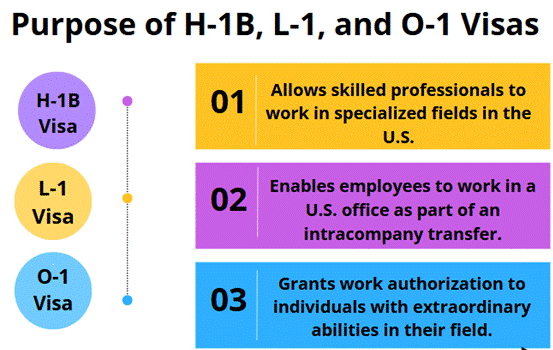Why is it in the news
- The US administration imposed a $100,000 fee on fresh H-1B applications, prompting companies and workers to explore alternative work visas.
- The L-1 visa is being discussed as a potential alternative for certain employees of multinational companies.
- Policy relevance: Could affect Indian IT firms, Big Tech, and global talent mobility.
Relevance:
- GS II (International Relations & Policy): US visa policies, bilateral labour mobility implications.
- GS III (Economy & Industry): Global talent mobility, Indian IT and Big Tech staffing strategies, international labour arbitrage.

Understanding the L-1 visa
- Definition: L-1 is a non-immigrant intra-company transfer visa for executives, managers (L-1A), or employees with specialized knowledge (L-1B).
- Eligibility:
- Must have worked abroad for the same multinational firm for at least 1 continuous year in the past 3 years.
- Only the employer can petition; individuals cannot apply independently.
- Duration:
- L-1A: 7 years max (executives/managers)
- L-1B: 5 years max (specialized knowledge employees)
- Advantages:
- No lottery or quota; can apply year-round.
- “Blanket petitions” allow faster processing for large firms.
- L-1 holders can pursue a green card without jeopardizing status.
- Limitations:
- Tied to a single company; cannot switch employers freely.
- Not available to F-1 students (lack of prior international work experience).
- Cannot extend simply while awaiting a green card beyond allowed period.
L-1 vs H-1B: Key Comparisons
| Feature | L-1 | H-1B |
| Purpose | Intra-company transfers | Specialty occupation workers |
| Eligibility | 1 year abroad in same firm | Bachelor’s degree or higher in relevant field |
| Cap / Quota | No cap | 85,000/year (65k regular + 20k advanced degree) |
| Lottery | No | Yes |
| Prevailing wage | Not required | Required |
| Duration | L-1A: 7 yrs, L-1B: 5 yrs | Initial 3 yrs, max 6 yrs |
| Employer flexibility | Tied to same company | Can switch employers with new petition |
| Green card | Allowed, does not jeopardize status | Allowed, but may require extensions for pending GC |
| Student eligibility | F-1 ineligible | Optional through H-1B post-F-1 OPT |
- Conclusion: L-1 is not a blanket substitute for H-1B; it is specialized for multinational transfers, advantageous for eligible employees but limited in scope.
Current Data
- L-1 issuance (US State Dept):
- FY2019: 76,982
- FY2021 (pandemic low): 24,863
- FY2023: 76,571
- Refusal rates increased from ~7% to 12% in 2023.
Strategic & Policy Implications
- For Indian IT and Big Tech firms:
- May rely more on L-1 transfers for eligible employees to mitigate the $100,000 H-1B fee.
- Encourages offshore staffing models for employees ineligible for L-1.
- Talent mobility: L-1 ensures retention of highly skilled employees within multinational structures.
- US perspective: Maintains focus on protecting domestic labor while still allowing multinational firms to bring experienced talent.
- Global competition: Other countries (Canada, Australia, UK) may attract H-1B-eligible workers unable to use L-1.



